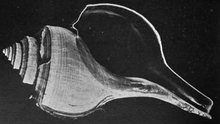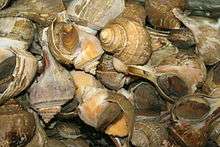Busycotypus canaliculatus
| Channeled whelk | |
|---|---|
 | |
| A shell of a channeled whelk | |
| Scientific classification | |
| Kingdom: | Animalia |
| Phylum: | Mollusca |
| Class: | Gastropoda |
| (unranked): | clade Caenogastropoda clade Hypsogastropoda clade Neogastropoda |
| Superfamily: | Buccinoidea |
| Family: | Busyconidae |
| Genus: | Busycotypus |
| Species: | B. canaliculatus |
| Binomial name | |
| Busycotypus canaliculatus Linnaeus, 1758 | |
| Synonyms[1] | |
| |
The channeled whelk, Busycotypus canaliculatus, previously known as Busycon canaliculatum, is a very large predatory sea snail, a marine prosobranch gastropod, a busycon whelk, belonging to the family Busyconidae. [1]
Distribution
This species is endemic to the eastern coast of the United States, from Cape Cod, Massachusetts to northern Florida. It has also been introduced into San Francisco Bay.
Shell description

Shells of the channeled whelk typically reach 5 to 8 inches in length. The shell is smooth and subpyriform (generally pear-shaped), with a large body whorl and a straight siphonal canal. Between the whorls there is a wide, deep channel at the suture, and there are often weak knobs at the shoulders of the whorls. Finely sculpted lines begin at the siphonal canal and revolve around the shell surface.
The color of the shell is typically a buff gray to light tan. The shell aperture is located on the right side, i.e. the shell of this species is almost always dextral in coiling. Left-handed or sinistral specimens occur rarely.
Channeled whelks prefer sandy, shallow, intertidal or subtidal areas, and can be common in these habitats. They tend to be nocturnal and are known to eat clams.
One of their predators is the blue crab Callinectes sapidus. [2]
Human Uses
This species is edible.
Historically, American Indians used the channeled whelk as a component in wampum, the shell beads exchanged in the North American fur trade.[3]
References
- 1 2 Fraussen, K.; Rosenberg, G. (2012). Busycotypus canaliculatus (Linnaeus, 1758). Accessed through: World Register of Marine Species at http://www.marinespecies.org/aphia.php?p=taxdetails&id=160192 on 2012-08-30
- ↑ Dietl & Alexander, Shell Repair Frequencies in Whelks and Moon Snails from Delaware and Soputhern New Yersey, Malacologia v. 39 (1998), p.152
- ↑ White, Richard (1991). The Middle Ground. New York: Cambridge University Press. p. 97.
- Rosenberg, G. 1992. Encyclopedia of Seashells. Dorset: New York. 224 pp. page(s): 92
- Pollock, L.W. (1998). A practical guide to the marine animals of northeastern North America. Rutgers University Press. New Brunswick, New Jersey & London. 367 pp
External links
| Wikimedia Commons has media related to Busycotypus canaliculatus. |